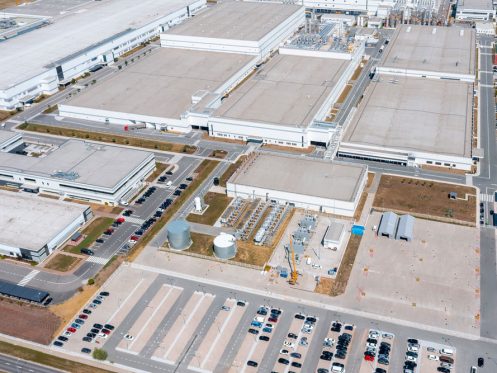Your industrial roof may be working fine right now. But if you don’t think about it often enough, you’re sure to experience some issues later on. Maintaining the quality of your roof is critical to preserving your building’s structural integrity. It will also be helpful in keeping your employees productive and safe. Small issues can turn into major problems, which can drastically impact your business. And you’ll end up having an expensive repair bill.
Industrial roofs have to be tougher, and the people who manage these facilities need to stay vigilant. Here are some things that you should think about for your industrial roofing project.
#1: Your Roof is a Work Platform
While keeping water out of the building’s interior is one of the main functions of industrial roofing, they’re also part of a working system that includes various mechanisms (such as HVAC systems, grease vents, and process piping). And all of them need to be serviced on a regular basis. Whenever sharp tools are dropped, HVAC panels cut through the roofing membrane, or dropped screws and nails are walked on, some kind of damage is likely to occur.
Regular foot traffic is hard on the roof, which is why industrial roofing needs to be durable. All that wear and tear can affect the roof’s lifespan and will increase the need for more frequent repairs. For industrial facilities, leaks are more than just a nuisance. Even the smallest penetration can cause major problems.
SBS bitumen or a thicker single-ply membrane at approximately 90 mil are often used for their durability. Dense cover board is also recommended, because it can keep the insulation from getting crushed. But even the most durable roof isn’t invincible, which is why you need to keep people off of it as much as possible.
Installing walkway systems (whether they’re mats or elevated steel walkways) can protect your roof’s integrity in areas where it’s not possible, but you need to make sure employees and contractors understand the importance of staying on the path. You also want to have the roof checked out on a regular basis. You may need to inspect it up to four times a year, especially if it experiences a great deal of foot traffic.
#2: People are Working on the Roof
Because so many people are on the roof to maintain your roofing system, it’s important to protect them from injury. The most dangerous areas are skylights, roof hatches, and other holes that people can fall through. Not to mention, the perimeter edge where someone could fall off. Ask your roofing contractor how it can be designed and maintained to minimize the potential for accidents. Be sure to install permanent fall protection equipment (such as horizontal lifelines and guard rails), and train your employees on how to use it properly.
Chemicals, grease, oil, acid, and fat can do more than just damage your roof. They can also make the surface slippery for rooftop workers. That’s why you need to look at the source of processing residue, repair leaking equipment, and redirect emissions or discharge. You can also install grease guards to filter and collect these substances from rooftop exhaust systems.
#3: The Roof is Full of Processing Pipe
Industrial roofs will have more penetrations than other roofing systems, which put them at a greater risk for leaks. Whenever a roof is full of processing pipes, the system becomes more complex. Ammonia lines may require a subcontractor to move them, which can make the project timeline much longer. Processing pipes will also affect any reroofing decisions when the roof gets close to the end of its lifespan.
Recovering the roof by installing another system or even adding more insulation can cause a proverbial domino effect, because both of them will increase the roof’s volume. That’s why you should contact your roofing contractor if you’re planning to modify the roof with a new penetration. This person will be able to advise you on how to add enough spacing between them and will be able to give you more details about how to install the flashing. Doing this will make sure these areas have been properly sealed.
#4: Your Choice of Roofing Contractors
Regardless of how durable your industrial roofing is, an improper installation will be a waste of your time and money. Don’t get carried away by contractors who show up at your door unannounced as they offer their “trusted” services. Do your own research, so you can make a more informed choice.
If you’re looking for one of the best places for industrial roofing in Corpus Christi, be sure to reach out to Bayfront Roofing.
